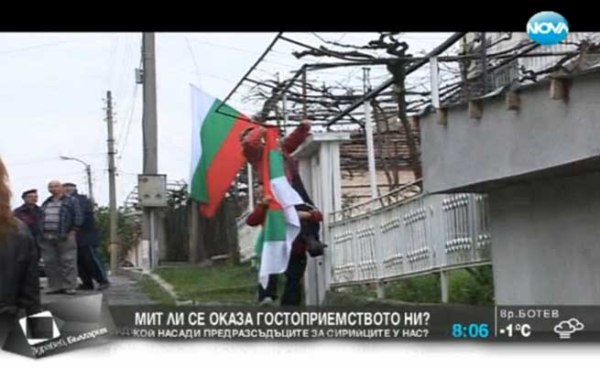How do you change a culture?
 (I am writing this in English because I need the input of my non-Bulgarian friends.)
(I am writing this in English because I need the input of my non-Bulgarian friends.)
Earlier today, I read a report about three Syrian families (17 people, including several small children) in Bulgaria who had been granted refugee status and living in the village of Rozovo. The families had been renting a house there for a few DAYS but this morning were forced to leave after growing pressure by the locals, who did not want them there. The reasons given by the locals are so insanely disturbing, I am really embarrassed to repeat what has been said but here it is. These have been given as reasons why these people should not be allowed to stay:
- „Bulgaria is for Bulgarians.“
- They (Syrians) are dirtier than gypsies.
- They might damage locals’ properties.
- Locals are worried about sexual violence.
- Rozovo is a „clean“ village, there are not even gypsies there (!!!)
- „We are afraid of foreigners, we don’t know what sort of people they are. We want our village to remain peaceful. We haven’t used violence against them.“
- They must leave, or else!
This is disturbing for so many reasons, it’s really hard to figure out where to begin but what has been especially infuriating about this is the total lack of involvement or engagement by local law-enforcement. Granted, I wasn’t there… so I may be giving an inaccurate account of what actually transpired on the ground, but from the various news reports that I read and cross-referenced, it appears to me that there were police officers present at the various protests staged by the locals but what they did was stand around. It sounds like there were there to stop people from physically attacking the refugees but they did not disperse what was clearly a crowd motivated by ethnic hatred and prejudice and clearly focused on intimidating the refugee families to the point where they would decide to leave. (Mission accomplished).
All of this is happening as Human Rights Watch (HRW) is getting ready to present TOMORROW a report on the treatment of refugees by Bulgarian Border Police. According to the report, which has been vehemently disputed by the Bulgarian Minister of Interior, Bulgarian border policemen are forcing Syrian, Afghan and other refugees. According to HRW, Bulgarian refugee policies are appallingly inadequate. The living conditions in the refugee settlements are awful, children without parents are not taken care of in any way and there is absolutely no effort being made into supporting refugees in getting integrated or having an iota of chance to normal life while in Bulgaria.
What makes me sick about the case of the Rozovo families is that it absolutely demonstrates how hopeless the situation is. Bulgaria’s half-assed refugee program is not a legal problem, it is a cultural problem. People who hold racist beliefs can’t create policies that are not racists. Syrian (and other) refugees are becoming victims of unexamined prejudices and stereotypes and no push from the EU (or the US or whoever) can have any actual impact until these prejudices truly become a topic of discussion and national dialogue. What could any policy solve the Rozovo case when some guy is posting a Bulgarian flag in front of the refugee’s house, yelling „Bulgaria is for Bulgarians“ and still maintains that his protest has „nothing to do with ethnicity“. These people don’t think they are being racist. They are doing what they’ve got to do for „for their children.“
So, my question to you: how do you change a culture that is in desperate need of changing and FAST.
Разследващите и социалните журналисти
Докато четях ето тази статия, представяща новите водещи на новинарската емисия на bTV, забелязах че и Иван Георгиев, и Лиляна Боянова са завършили СУ-Журналистика. Той е специализирал разследваща журналистика, а тя социална (интересува се от теми, свързани с образованието и здравеопазването). Очевидно и двете сфери – и разследващата, и социалната – журналистика са еднакво важни и значими, но ми прави впечатление, че почевето разследващи журналисти в България са мъже, а повечето социални репортери са жени.
Някой има ли наблюдения защо това е така?
Двете най-опустошителни думи, които чува едно момче: БЪДИ МЪЖ.
Ние, протестиращите
Емигрант няколко пъти
Когато гледаш отдалече какво се случва в държавата ти по време на политическа криза, се чувстваш емигрант няколко пъти.
Първо, защото виждаш, че на хората им е прикипяло и искаш да си там с тях, на площада. Защото знаеш, че са прави.
Втори път, защо трябва да обясниш на твоите хора там, където си в момента… какво точно се случва, защо хората в България протестират. Защо хиляди са се изсипали на улицата. И докато обясняваш кой на кого е син, какви бизнеси имат и в какви корупционни схеми са замесени… виждаш как човекът срещу теб започва да гледа все по-объркано и неразбиращо. Не му е ясно как всички знаят, че еди-кой-си е престъпник, а той продължава да трупа политически и финансов капитал. Нали има закони?! Съдебна система?! Еми… има, ама не работят.
И трети път, докато гледаш снимки и следиш update-и от протестиращите… все млади хора, на твоите години… и в един момент усетиш, че хомофобските политически шегички… в крак с така обрисувания политически цирк… започват да ти идват малко в повече. Трудно ми е да се идентифицирам с държава, в която хората изпитват по-голяма толерантност към политическия произвол и потъпкването на закона, отколкото към свовободата на себеизразяване и сексуалната ориентация на хората.



